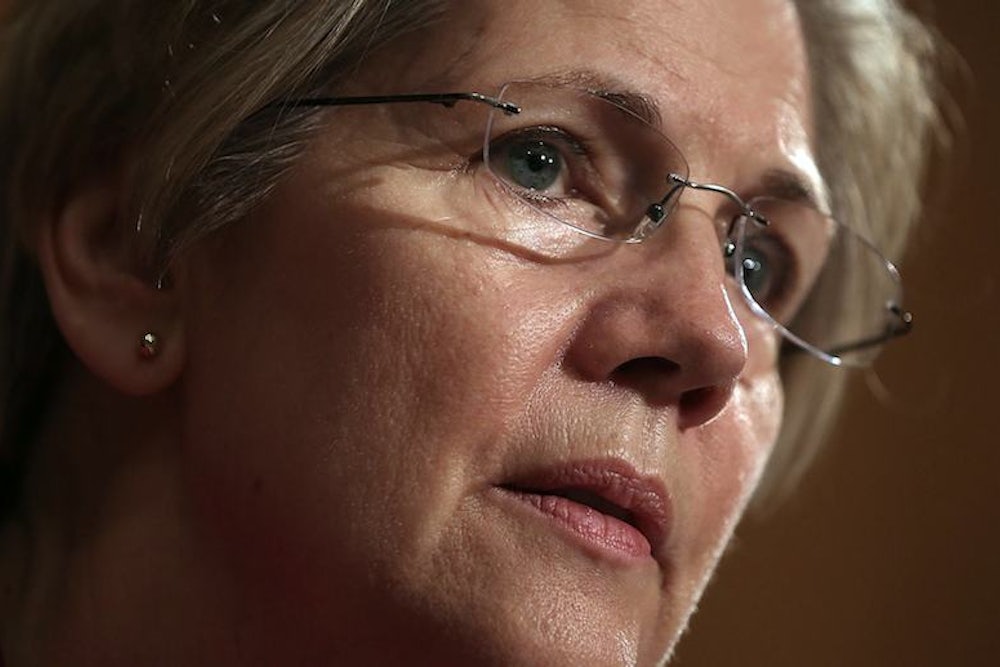It was a pretty glum scene at a presser on student debt Thursday afternoon, in a room on the fourth floor of the Dirksen Senate Office Building. A few hours earlier, the bill with the best chance of averting a doubling of the loan interest rate this July 1 had failed to clear the upper chamber by nine votes. Outside, it threatened to rain; inside, the college students arrayed behind the politicians didn’t even bother to smile.
But the bill’s authors, Democratic senators Tom Harkin and Jack Reed, seemed prepared for a dour audience of disappointed supporters and skeptical reporters. Perhaps that’s why they brought reinforcements, or at least, a distraction: Massachusetts Senator Elizabeth Warren.
Warren, a co-sponsor on Harkin and Reed’s proposal (which would extend the current interest rate of 3.4 percent for another two years), has her own piece of legislation knocking around the Senate: let students pay what the big banks pay to the Federal Reserve, interest at 0.75 percent. The Bank on Students Loan Fairness Act has made her a favorite among American college students these past few weeks as she has bounced among campuses, working herself into a lather over government favoritism of financial giants. Essentially, Warren took a policy conundrum dense with decimal points and turned it, as is her wont, into a David and Goliath tale. By all accounts, her bill has zero chance of passing, but her touch of political artistry has made her the accidental face of the student-loan debate.
Warren, of course, has made a name for herself—and become a sort of liberal savior—by lambasting Wall Street banks without mercy or pause. And in some ways, as a former professor, she’s a natural advocate for students. But the way she’s chosen to frame this issue, while effective, also makes it feel like a tangent from her larger crusade. As she put it when she introduced the bill, her first standalone effort as a senator: “We shouldn’t be profiting from our students who are drowning in debt while we’re giving great deals to big banks.” Warren deserves credit for bringing the student-debt debate some much-needed publicity. As many have noted, though, the legislative battle over loans has become damagingly divorced from related issues—like the skyrocketing cost of tuition, which is sending so many students into debt in the first place. It would be helpful if she illuminated that context, rather than framing the student loans fight in the language of her pet issue.
Reed and Harkin seem to hope their bill, which is more moderate than Warren’s and has a better shot, can ride the coattails of their colleague’s moral outrage across the 60-vote line. At the presser, Harkin grabbed Warren by the hand and dragged her forward. “Big banks borrow at what rate again?” he asked. “Less than one percent,” she said, pressing her hands together with exaggerated resoluteness. “Three quarters of one percent.”
If anything, Warren seemed a little embarrassed to be so obviously stealing the show. The last time she stepped up to the podium, she got a little carried away and ended, an octave higher and a little viciously, on a rallying cry: “We’re going to get this. We’re going to get the right kind of bill, because we’ve got enough energy behind this.” Then she hunched her shoulders and sunk backwards into the ring of senators, muttering, “Sorry, sorry,” to appreciative laughter from the assembled press. “Do you want more time?” one senator joked .
Opinion on Warren’s bill is predictably divided. A number of national student groups, a quorum of Boston-area colleges including M.I.T., and some heavyweight organizations like the American Federation of Teachers have endorsed it, but the Brookings Institution called the bill a “cheap political gimmick,” castigating its failure to account for the cost of administering the loans program and the magnitude of risk the government takes on from student borrowers. And although Slate’s Matt Yglesias liked the bill, he conceded, “the implication here that the government is somehow screwing college students while coddling banks is totally wrong. It's pure political theater.”
If the bill is theater, Warren is the star of the show. And if today’s presser is any indication, it’s a role she’s still not entirely comfortable with—too far astray, perhaps, from her Wall Street wheelhouse. At the beginning of her remarks, she praised her fellow senators who “have been out on these front lines for a long time,” a tacit admission that she has not been there all along. And it’s unclear how long she’ll be asked stay at the front lines. Education policy could use a champion with Warren’s charisma and following, but if she plans to stick around past what promises to be a grim July 1 deadline, she’ll need some new metaphors. Big banks aren’t the only Goliath.
Nora Caplan-Bricker is an assistant editor at The New Republic. Follow her on Twitter @ncaplanbricker.
